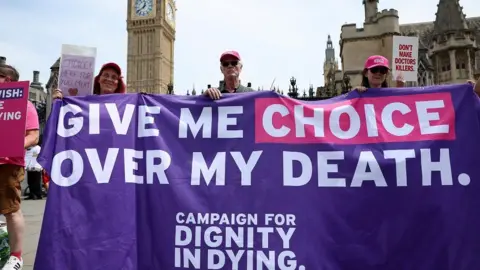A colossal social change that is now likely to become law
 Reuters
ReutersTake a step back, and it has been quite a few days.
This has been a week at Westminster that has seen two decisions that point to a socially liberal shift.
Just a few days ago, MPs voted to change abortion legislation to stop women in England and Wales being prosecuted for ending their pregnancy.
And now, the Commons has backed a change in the law in England and Wales to allow assisted dying, or, as some opponents call it, assisted suicide.
This vote doesn't guarantee this will happen - it will head next to the House of Lords - but it is now more likely than ever and widely expected to become law.
But even as and when it does reach the Statute Book and become law, it will likely be near the end of the decade before any assisted deaths happen.
The government said there would need to be a longer "commencement period" than advocates of the change had hoped for, in order to make all the necessary preparations.
The government's impact assessment suggests in the early years, it is likely hundreds will seek an assisted death.
It is estimated it may rise to around 4,000 a year after a decade.
Separately, the Scottish Parliament is considering its own bill. There are currently no plans for assisted dying in Northern Ireland.
It is a colossal social change, compared by many to the Abortion Act of 1967, the abolition of capital punishment, the decriminalisation of homosexuality and the introduction of gay marriage.
MPs had a free vote in both of this week's votes.
But it is also true that the change in the composition of the Commons at the general election - and, in particular, the arrival of hundreds of new Labour MPs - has created the climate and the mood in parliament that has allowed both these votes to pass.
Opinion polls have consistently pointed to significant public support for a change in the law.
A YouGov poll earlier this week suggested over seven in 10 Britons supported these assisted dying proposals.
But MPs today were conscious of stepping beyond a discussion of the principles of this idea to scrutiny of the practicalities of this particular bill.
And the vote was mighty close - 604 MPs voted either for or against, and the majority in favour was just 23.
Some opponents told the Commons they believed in a change in the law in principle, but were opposed to this particular bill.
And yet, in the end, MPs have said yes to this change in the law – and so this is a hugely significant, unprecedented moment.
In 2015, the Commons rejected changing the law.
It did so in 1997 too.
Not this time.
The arguments were no less passionate.
Even the terminology is fought over.
While plenty use the shorthand of "assisted dying," for some opponents this is a misnomer.
It should, instead, they argue, be called "assisted suicide" or "assisted killing".
Those arguments will continue, but what will now happen is this bill will head to the House of Lords.
At the heart of the debate there will be the extent to which it is perceived to be reasonable for the upper chamber, which is unelected, to amend, delay or even scupper this bill.
Kim Leadbeater, the Labour MP who has led the campaign for change, told me she expected the Lords, in the end, to acknowledge the elected supremacy of the House of Commons.
But the Conservative MP Danny Kruger, an opponent of assisted dying, said it would be constitutionally legitimate for the Lords to reject the bill outright, given it was not in Labour's manifesto for government. He sees it as the flawed nature of the law-making process and the narrow nature of the bill's passage through the Commons.
These arguments and the bill's passage through the Lords could begin within the next few weeks.
Perhaps, then, by the end of the year, the law may well have changed in England and Wales.

Sign up for our Politics Essential newsletter to keep up with the inner workings of Westminster and beyond.
